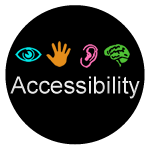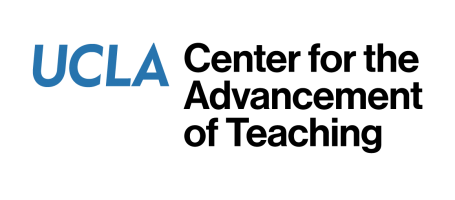From Equity to Belonging: Foundational Practices for Inclusive Teaching
Explore equitable teaching as a foundation for belonging and student success in meeting course goals.

Equitable and inclusive teaching practices help create educational environments in which all individuals are welcomed, respected, supported, and valued to fully participate in the learning process. A growing body of research–some of it conducted right here at UCLA–indicates that creating a positive classroom climate for diversity improves learning outcomes for all students, not only those from backgrounds that have been historically marginalized in higher education.
Equity is a core value for the Teaching and Learning Center, and we believe equity-minded teaching contributes to an inclusive campus environment where all students can thrive. We also recognize that the systemic nature of inequality–which has been amplified by the COVID-19 pandemic and ongoing racial reckoning within and beyond the United States–requires us to renew our commitment to advancing equity within our own programming and in UCLA courses. To help support the professional development of UCLA educators, this website gathers key resources and services from the Teaching and Learning Center and other units at UCLA, as well as resources from peer institutions and leading researchers in equity-minded teaching and learning.
This website is a work in progress. For help adapting any of these resources for use in your course or to suggest additional material to incorporate into this guide, contact us at consult@teaching.ucla.edu.
TLC offers workshops every quarter that create spaces for instructors of all ranks and backgrounds to explore how our intersecting identities impact teaching and learning systems, and to build our shared capacity to interrupt bias and implement more equitable courses. Click on the icons below to explore our workshops–and register through our events page HERE.
Explore equitable teaching as a foundation for belonging and student success in meeting course goals.
Explore how bias impacts course design and class dynamics, and develop skills for interrupting bias in the classroom.
Develop skills to recognize and interrupt bias in course design.
Learn strategies to proactively set norms supportive of an inclusive classroom.
Explore how bias impacts course design and class dynamics, and develop skills for interrupting bias in the classroom.
Practice troubleshooting moments in the classroom when challenging content is being addressed.
In addition to the workshops listed above, which specifically center equitable teaching practices, many of our other workshops and programs explore specific aspects of instruction through an equity lens, such as student engagement or assessment. Visit the events page of the TLC website to view a complete list of upcoming workshops and register for programs. You can also learn more about our workshops for faculty and instructors here and about our workshops for teaching assistants here.
TLC also offers one-on-one consultations related to equity-minded teaching. Email us at consult@teaching.ucla.edu to schedule a consultation or to discuss the possibility of bringing our pedagogy workshops to your academic program.
Many other campus units in addition to TLC also offer programming and consultations related to equitable teaching, including:
Click to view a short guide featuring equitable strategies for synchronous and asynchronous classes, remote assessment options, and more.
Click to view a guide organized around four key principles: reflection, flexibility, transparency, and community-building.
Click to view a guide about developing community agreements to foster brave discussion in classes of all sizes.
General Resources
Resources for Equitable Remote Learning
Below, you will find links to some of the many campus units that provide supportive services for UCLA instructors, students, and staff. This list is not exhaustive.

![]()
We believe the following tips and strategies will help create inclusive and accessible learning environments, beyond accommodation, for a range of students with disabilities, as well as greatly benefit all students in keeping up with the coursework if they fall sick or are required to quarantine. Being proactive and flexible will make your life easier while benefiting students tremendously.
This page was created in collaboration with UCLA students in the Undergraduate Students Association Council (USAC) and the Disabled Student Union (DSU) and the UCLA Disabilities and Computing Program (DCP) to provide help for faculty navigate the ever-changing landscape due to the ongoing COVID-19 pandemic.
Ways to make lecture content available to absent students
Ways to include absent students in a classroom discussion or poll
Ways to enable absent students to take exams and other in-class assignments
Absent students take exams remotely at the same time as in-person students, over Zoom or other service that allows video, as well as verbal and text-based communication.
Absent students take exams remotely at the same time as in-person students, and can communicate questions by email or other text-based communication.
Absent students take exams at a different time from in-person students, when they can be present and proctored (e.g., by the instructor or TA).
Absent students are excused from an exam and the points are made up in a different way, e.g., midterm points are assigned to the final or to an alternative assignment.
Resources for Live-Streaming/Recording an In-Person Class
Recording and editing your lectures using Zoom
How-To: Set Up Zoom Meetings in Bruin Learn
How-To: Record a Zoom Meeting and Add it to Bruin Learn
UCLA Zoom Accessibility (with how to record and post it to CCLE) courtesy of DCP
Consider making closed captions and live transcription available in your Zoom meeting. Students can always choose to show or hide the closed caption and live transcription within your Zoom meeting.
Video 1: How to trim and clip Kaltura videos in Bruin Learn
Video 2: Editing Kaltura captions in Bruin Learn
Making your course materials (documents) accessible
PDF Accessibility courtesy of DCP
Helpful Document Accessibility Resources courtesy of DCP
Video: Making PDFs Accessible in Adobe Acrobat
The accessibility logo on the left was created by Christy Blew of The University of Illinois on behalf of the EDUCAUSE IT Accessibility Constituent Group. A goal of the Constituent Group is, in part, to raise awareness of accessibility among people who are involved in creating, purchasing, or deploying information technology on higher education campuses.
The Modified International Symbol of Access on the right was created by Sara Hendren and Brian Glenney who co-founded the Accessible Icon project, with the goal of designing a new icon to display an active, engaged image with focus on the person with disability.

70 Powell Library
Box 951515
Los Angeles, CA 90095-1515
